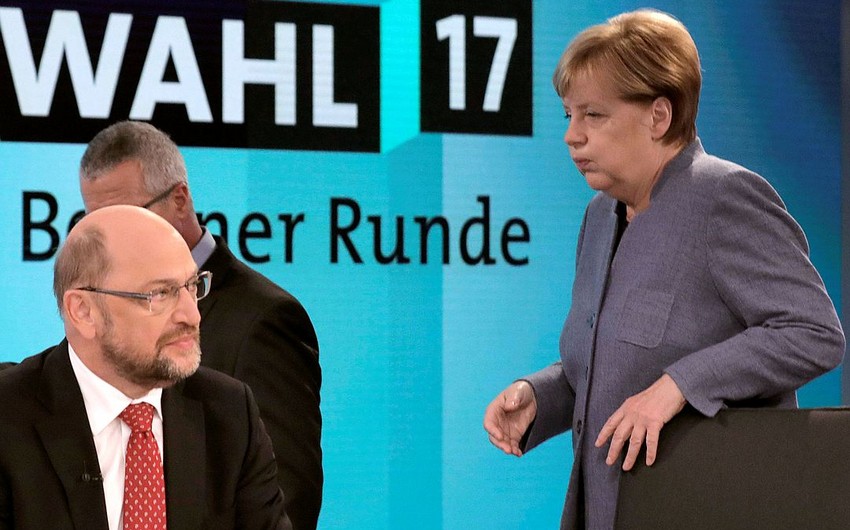Baku. 25 September. REPORT.AZ/ It is natural that everyone is curious about what happens in the leading countries of the world and hotspots. Because both of them affect other states.
The parliamentary elections to Bundestag was held on September 24 in Federal Republic of Germany (FRG). Although there was no doubt about free and fair elections in this country, it was predictable that leader of Christian Democratic Union (CDU) and Christian Social Union (CSU) 63-year-old Angela Merkel will gain victory for the fourth time. It seems a bit strange when in democratic societies such expectations prove themselves. For instance, remaining of the same person in power for the fourth time, victory of the same party and so on remind the situations in pseudo-democratic countries though comparison and approach is not proper.
Parliamentary election in Germany is held every four years. There are 61.5 million voters across the country over the age of 18. Germany’s parliament, is elected according to the principle of proportional representation, 50% majority, 50% proportional representation. 42 political parties participated in elections. According to results, CDU/ CSU earned 33% (CDU26.8 %, CSU 6.2%), Social Democratic Party 20.5 %, Alternative for Germany 12.6%, Free Democratic Party 10.7%, Leftists 9.2%, “Greens” 8.9%.They will be represented in the parliament surmounting the 5 percent barrier.

Alliance of Angela Merkel received 246 seats in Bundestag (CDU 200, CSU 46), Social Democratic Party 153, Alternative for Germany 94, Free Democratic Party 80, “Leftists” 69 and “Greens” 67 seats.
By the way, it was the lowest result for Christian Democratic Union since 1949.
In 2013 elections alliance of Angela Merkel won 41.5% of the vote, gaining 311 seats out of 634, the best results for the last 20 years. They were five seats short for an overall majority. CDU created coalition government with Social Democrats which took the second place.
In 2013 Social Democrats gained 25.7% of votes, "Leftists" Party – 8.6%, “Greens” – 8.4%. Since Free Democratic Party failed to win 5 percent of the vote they did not receive seats in the parliament.
As compared with last yelection we can see that ruling alliance and social-democrats lost their votes to opposition parties. Free Democratic Party and established four years ago Alternative for Germany gained victory in this election. One of the innovations in political campaign is representation of alternatives in the parliament.

Party pursues conservative, right-wing radical, political and ideological policy. They are known for anti-immigration, anti-Islamic and national messages. In 2013 parliamentary elections they gained 4.7% of votes and failed to surmount the 5 percent barrier. Alternatives want to refuse from Euro and lifting the sanctions on Russia. They are represented in European Parliament with two members. They took 166 out of 1821 seats in state parliaments.
One of the leaders of the party Alexander Gauland, in front of his supporters said Alternatives will be strong opponent of Angela Merkel: “We will reclaim our country and our people.” In Germany they are considered to be neo-Nazis. Following the voting, protests held in different regions of the country against alternatives.
Free Democratic and Alternatives earned the votes that was lost by Angela Merkel’s alliance and other parties.

Angela Merkel announcing the preliminary results of election said she is ready to form a new government: “We are strong party. We were tasked to form a new government. Of course we hoped for a better result.” She said Cabinet of Ministers will form a government, until Christmas, December 25.
The chairman of the Social Democratic Party Martin Shulz said in front of his supporters that he will lead the party and join opposition leaving the ruling coalition. That’s why political forces that will form the Angela Merkel’s government is not less important. They need 355 out of 709 seats in parliament to form new government. Alliance has 246 seats. Therefore in order to form coalition government gaining 109 seats they need to find common language with Alternatives for Germany (94 seats), Free Democratic Party (80 seats), “Leftists” (69 seats) and “Greens” (67 seats). Since there was a practice of forming coalition with Free Democratic the identity of the second political forces is not less important.
So far Angele Merkel did not name the party to form coalition with. Nevertheless, “Greens” expressed readiness to participate in coalition with government.
Despite that it was the worst results in history of CDU for the last 68 years Angela Merkel still have a chance to become the chancellor for the fourth time. After the war rightists in the face of alternatives were an integral part of German policy.

Moreover, as the strongest country of EU, Germany’s role in such issues as increasing the activity of EU in the processes going in the Near East, demonstrating new position towards Iran are also significant. Combatting the terror in Europe is one of the important issues.
Between 2006 and 2016 219 arrests have been made on suspicion of preparing and organizing terror in the country. During that period 39 committed, failed and prevented terror attacks recorded in Germany.
Besides alternatives election did not bring anything new to political arena of Germany. It is possible to presume Angela Merkel will be reelected as chancellor, and continue to pursue policy not different from previous years. Unlike in France, new political force did not come to power in Germany. It means German voters do not trust government to new political forces or there is no alternative for Christian Democratic Union? The answer to that question is alternative is not developed yet.


 https://static.report.az/photo/049fd425-3ab1-45f9-8eb4-7acb07121aa9.jpg
https://static.report.az/photo/049fd425-3ab1-45f9-8eb4-7acb07121aa9.jpg

